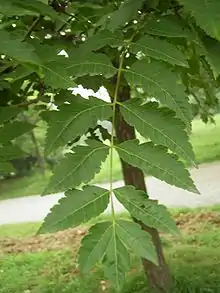Koelreuteria paniculata
Koelreuteria paniculata is a species of flowering plant in the family Sapindaceae, native to eastern Asia, in China and Korea. It was introduced in Europe in 1747, and to America in 1763, and has become a popular landscape tree worldwide.[1][2] Common names include goldenrain tree,[3][4] pride of India,[5] China tree,[6] and the varnish tree.[4]
| Koelreuteria paniculata | |
|---|---|
 | |
| Foliage and flowers of var. apiculata | |
| Scientific classification | |
| Kingdom: | Plantae |
| Clade: | Tracheophytes |
| Clade: | Angiosperms |
| Clade: | Eudicots |
| Clade: | Rosids |
| Order: | Sapindales |
| Family: | Sapindaceae |
| Genus: | Koelreuteria |
| Species: | K. paniculata |
| Binomial name | |
| Koelreuteria paniculata | |

Description
It is a small to medium-sized deciduous tree growing to 7 m (23 ft) tall, with a broad, dome-shaped crown. The leaves are pinnate, 15–40 cm (6–16 in) long, rarely to 50 cm (20 in), with 7-15 leaflets 3–8 cm long, with a deeply serrated margin; the larger leaflets at the midpoint of the leaf are sometimes themselves pinnate but the leaves are not consistently fully bipinnate as in the related Koelreuteria bipinnata.
The flowers are yellow, with four petals, growing in large terminal panicles 20–40 cm (8–16 in) long. The fruit is a three-part inflated bladderlike pod, 3–6 cm long and 2–4 cm broad, that is green, then ripening from orange to pink in autumn. It contains several dark brown to black seeds 5–8 mm diameter.
There are two varieties:
Cultivation
It is popularly grown as an ornamental tree in temperate regions all across the world because of the aesthetic appeal of its flowers, leaves and seed pods. Several cultivars have been selected for garden planting, including 'Fastigiata' with a narrow crown, and 'September Gold', flowering in late summer.
In the UK the cultivar ‘Coral Sun’ has gained the Royal Horticultural Society's Award of Garden Merit.[8][9]
In some areas, notably the eastern United States and particularly in Florida, it is considered an invasive species.
Gallery
 Fruits
Fruits Bark
Bark Flowers & legumens in the top of a tree in São Paulo Brazil
Flowers & legumens in the top of a tree in São Paulo Brazil Seed pod, Butler County, Kansas
Seed pod, Butler County, Kansas Seed pod and leaves, Harvey County, Kansas
Seed pod and leaves, Harvey County, Kansas
Notes
- "Golden Rain Tree Koelreuteria paniculata". Monrovia. Retrieved 10 July 2017.
- "Goldenraintree Tree on the Tree Guide at arborday.org". www.arborday.org. Retrieved 2017-07-10.
- "PLANTS Profile for Koelreuteria paniculata (goldenrain tree)". Natural Resources Conservation Service. United States Department of Agriculture. Retrieved 8 August 2011.
- UConn Plant Database Archived 2009-06-25 at the Wayback Machine
- RHS A-Z encyclopedia of garden plants. United Kingdom: Dorling Kindersley. 2008. p. 1136. ISBN 1405332964.
- goldenrain tree.Encyclopædia Britannica Online. Encyclopædia Britannica. Retrieved 2008-07-12.
- Sargent, Charles (1916). Plantae Wilsonianae : An enumeration of the woody plants collected in western China for the Arnold Arboretum of Harvard University during the years 1907, 1908, and 1910 by E. H. Wilson. Cambridge (Mass): University Press. pp. 191–193.
- "RHS Plantfinder - Koelreuteria paniculata 'Coral Sun'". Retrieved 18 March 2018.
- "AGM Plants - Ornamental" (PDF). Royal Horticultural Society. July 2017. p. 57. Retrieved 17 March 2018.
References
External links
| Wikimedia Commons has media related to Koelreuteria paniculata. |
- Dosmann, Michael S., Whitlow, Thomas H., and Ho-Duck, Kang. "The (un)Natural and Cultural History of Korean Goldenrain Tree." Arnoldia 64 (1) (2006).
- Santamour, Frank S.and Spongberg, Stephen A. "’Rose Lantern’: A New Cultivar of Koelreuteria paniculata, the Golden-Rain Tree." Arnoldia 56 (2) (1996).